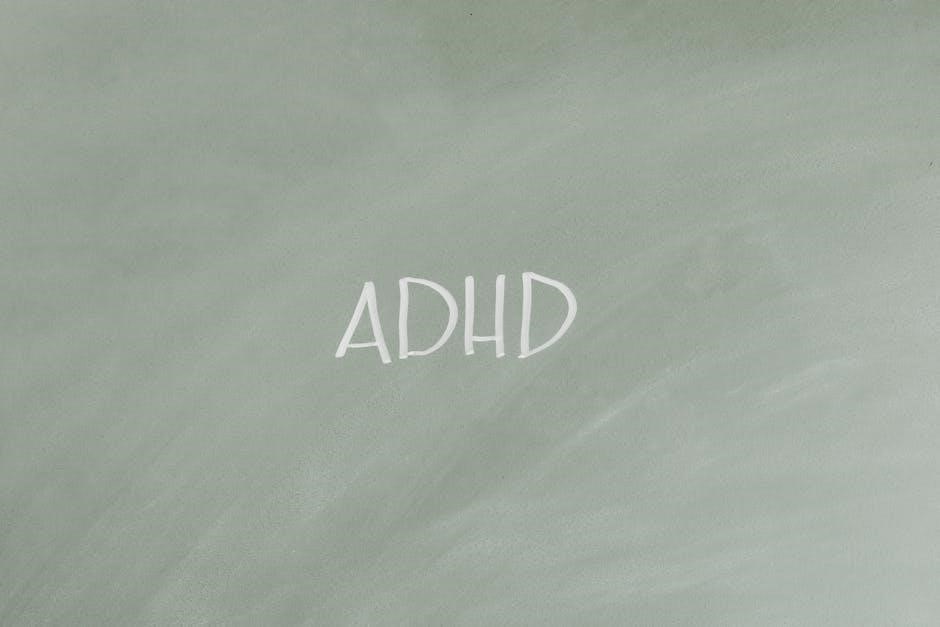Evidence-Based Interventions for ADHD
Evidence-based interventions for ADHD include cognitive-behavioral therapy‚ behavior modification‚ and emerging technologies like VR. These approaches are supported by research and tailored to individual needs.
1.1 Overview of Evidence-Based Practices
Evidence-based practices for ADHD include interventions like cognitive-behavioral therapy (CBT)‚ behavior modification‚ and emerging technologies such as virtual reality (VR). These approaches are supported by rigorous research and tailored to individual needs. They often combine psychosocial strategies with educational and technological tools to address ADHD symptoms effectively. Resources like PDF guides and research papers provide therapists with practical techniques and study-backed methods for implementation.
1.2 Cognitive Behavioral Therapy (CBT) Techniques
Cognitive Behavioral Therapy (CBT) is a leading evidence-based approach for ADHD‚ focusing on identifying and altering negative thought patterns and behaviors. Techniques include identifying cognitive distortions‚ restructuring thoughts‚ and developing practical coping strategies. CBT helps individuals with ADHD manage symptoms like inattention and impulsivity‚ often integrated with other therapies for comprehensive care. Research supports its effectiveness in improving daily functioning and reducing symptom severity.
1.3 Behavior Modification Strategies
Behavior modification is an evidence-based approach for ADHD‚ focusing on teaching skills to parents‚ educators‚ and the child. Techniques include positive reinforcement‚ token economy systems‚ and environmental adjustments to reduce problem behaviors. These strategies help individuals with ADHD manage impulsivity and improve focus‚ often used alongside other therapies for comprehensive behavioral management.
Cognitive Behavioral Therapy (CBT) for ADHD
Cognitive Behavioral Therapy (CBT) is an evidence-based approach for ADHD‚ proven effective with or without medication. Researchers have identified key techniques to manage symptoms‚ improving focus and daily functioning.
2.1 Key Components of CBT in ADHD Management
Cognitive Behavioral Therapy (CBT) for ADHD focuses on identifying and changing negative thought patterns. Key components include cognitive restructuring‚ behavioral activation‚ and skills training. Techniques such as problem-solving‚ emotional regulation‚ and practical strategies help individuals manage symptoms. CBT also emphasizes goal-setting and self-monitoring‚ enabling patients to develop adaptive behaviors and improve daily functioning. These strategies are tailored to address specific ADHD-related challenges effectively.
2.2 Efficacy of CBT in Reducing ADHD Symptoms
Cognitive Behavioral Therapy (CBT) has shown significant efficacy in reducing ADHD symptoms. Research indicates that CBT‚ often combined with medication‚ improves attention‚ reduces impulsivity‚ and enhances emotional regulation. Studies highlight its effectiveness in teaching practical strategies for time management and organization. CBT also addresses co-occurring issues like anxiety‚ making it a versatile and evidence-based treatment for both children and adults with ADHD.
Behavioral Interventions and Strategies
Behavioral interventions emphasize positive reinforcement‚ token economies‚ and structured routines to manage ADHD symptoms effectively‚ promoting long-term behavioral change in individuals.
3.1 Organizational and Time Management Techniques
Organizational and time management techniques are crucial for ADHD management. Strategies like task breakdown‚ checklists‚ and digital tools help individuals stay focused and meet deadlines. Therapists can guide clients in creating structured schedules and using visual reminders to enhance productivity and reduce procrastination‚ fostering independence and accountability in daily routines.
3.2 Positive Reinforcement and Token Economy Systems
Positive reinforcement and token economy systems are effective behavioral interventions. These methods use rewards to encourage desired behaviors‚ such as completing tasks or maintaining focus. Therapists can implement token systems‚ where individuals earn tokens for positive actions‚ redeemable for rewards. This approach enhances motivation‚ reinforces constructive habits‚ and fosters a sense of accomplishment‚ promoting long-term behavioral change in individuals with ADHD.

Role of Parents and Teachers in ADHD Interventions
Parents and teachers play a crucial role in implementing consistent strategies and providing support. Their collaboration ensures a cohesive approach to managing ADHD behaviors effectively across settings.
4.1 Training for Parents and Educators
Training programs for parents and educators focus on behavior management and support strategies. These programs emphasize understanding ADHD characteristics‚ creating structured environments‚ and using positive reinforcement. Educators learn classroom accommodations‚ while parents gain skills to implement consistent routines and positive reinforcement at home‚ ensuring a cohesive approach for the child’s success in both settings.
4.2 Collaborative Approaches Between Home and School
Collaborative approaches between home and school are essential for managing ADHD. Ensuring consistent strategies in both settings helps children thrive. Regular communication through tools like behavior report cards or apps ensures alignment and supports the child’s needs. The goal is to create a unified support system‚ fostering academic and behavioral success. By combining home and school expertise‚ collaborative approaches enhance consistency and positive outcomes for children with ADHD.
Emerging Technologies in ADHD Therapy
Emerging technologies‚ such as VR and digital therapeutic devices like EndeavorRx‚ offer innovative solutions for ADHD therapy‚ improving focus and reducing symptoms effectively.
5.1 Virtual Reality (VR) Research and Applications
Virtual reality (VR) research explores its potential in ADHD therapy‚ offering immersive environments to improve attention and reduce hyperactivity. Studies demonstrate VR’s effectiveness in enhancing focus and behavior management‚ providing a promising tool for therapists to integrate into treatment plans‚ with applications in both clinical and home settings.
5.2 Digital Therapeutic Devices (e.g.‚ EndeavorRx)
Digital therapeutic devices like EndeavorRx offer innovative‚ evidence-based treatments for ADHD. Approved for children aged 8–12‚ EndeavorRx uses a video game approach to improve attention and working memory. These devices provide accessible‚ engaging interventions that can be used at home or in clinical settings‚ supported by clinical studies demonstrating their effectiveness in reducing ADHD symptoms.
Educational and Academic Support Strategies
Educational support includes tailored learning strategies and study skills development‚ helping students with ADHD improve academic performance through structured‚ evidence-based approaches and accommodations;
6.1 Learning Strategies and Study Skills Development
Learning strategies and study skills development are crucial for students with ADHD. Techniques like the Pomodoro method‚ active reading‚ and chunking tasks enhance focus and retention. Training in organization‚ time management‚ and self-monitoring improves academic performance. These evidence-based approaches‚ often paired with digital tools‚ empower students to overcome challenges and develop independent learning habits‚ tailored to their unique needs and strengths.
6.2 School-Based Interventions and Accommodations
School-based interventions and accommodations are vital for ADHD management. Strategies include preferential seating‚ extended time for assignments‚ and the use of assistive technology. Behavioral interventions‚ like token economy systems‚ reinforce positive conduct. Collaborative efforts between teachers and therapists ensure a supportive learning environment‚ addressing both academic and behavioral challenges effectively to promote student success and inclusion in educational settings.
Pharmacological and Non-Pharmacological Approaches
Pharmacological and non-pharmacological approaches are effective ADHD treatments. Medication is often combined with therapy‚ while non-drug options like CBT and behavior modification offer alternative solutions tailored to individual needs.
7.1 Medication Management and Therapy Integration
Medication management is often integrated with therapy for ADHD‚ enhancing treatment efficacy. Studies show combining stimulants with CBT improves symptom reduction and functional outcomes. Therapists play a key role in monitoring medication effects and incorporating behavioral strategies.
7.2 Non-Drug Interventions and Their Effectiveness
Non-drug interventions‚ such as cognitive-behavioral therapy and behavior modification‚ are effective for ADHD. These approaches focus on skill-building and environmental adjustments. Research highlights their benefits in reducing symptoms and improving daily functioning‚ especially when combined with educational support and parental involvement.

Combined Approaches for Optimal Outcomes
Combined approaches‚ integrating CBT‚ medication‚ and behavioral strategies‚ show enhanced efficacy in managing ADHD. Tailored treatment plans ensure comprehensive support‚ addressing diverse needs effectively.
8.1 Integration of Multiple Therapeutic Modalities
Integrating CBT‚ behavioral strategies‚ and pharmacological treatments enhances ADHD management by addressing diverse symptoms. This multimodal approach ensures comprehensive support‚ often recommended for optimal outcomes. Tailored plans consider individual needs‚ combining therapies to maximize effectiveness and improve functioning across home‚ school‚ and social settings. Research supports this method for reducing complex ADHD-related challenges.
8.2 Long-Term Efficacy of Combined Interventions
Combined interventions demonstrate sustained benefits for ADHD management‚ reducing symptoms and improving academic and social functioning. Research shows that integrating therapies like CBT‚ behavior modification‚ and pharmacological treatments yields long-term efficacy. These approaches address diverse needs‚ providing consistent support and promoting overall well-being. Studies highlight the importance of tailored‚ multimodal plans for lasting positive outcomes in individuals with ADHD.
Mindfulness and Alternative Therapies
Mindfulness-based interventions and alternative therapies offer evidence-based support for ADHD management‚ reducing symptoms and enhancing focus. These approaches complement traditional treatments‚ providing holistic care options.
9.1 Mindfulness-Based Interventions for ADHD
Mindfulness-based interventions are gaining traction as effective complementary therapies for ADHD. These techniques‚ often integrated into CBT‚ help individuals develop self-regulation skills‚ reducing impulsivity and improving attention. Research highlights their potential to enhance emotional control and reduce stress‚ offering a non-invasive approach that can be adapted for both children and adults. Regular practice is key for sustained benefits.
9.2 Other Alternative Therapeutic Approaches
Alternative therapies like play therapy‚ art therapy‚ and yoga are increasingly used to support ADHD management. These approaches focus on emotional regulation‚ creativity‚ and physical activity to address symptoms. Research suggests they can complement traditional treatments‚ offering unique benefits for individuals with co-existing conditions like anxiety or depression. Their flexibility allows for personalized interventions tailored to diverse needs.

Cultural Competence in ADHD Therapy
Cultural competence in ADHD therapy involves understanding diverse cultural nuances to adapt interventions effectively. Tailored approaches ensure accessibility and sensitivity for individuals from varied backgrounds.
10.1 Addressing Diverse Needs in Therapeutic Settings
Addressing diverse needs in therapeutic settings requires therapists to adapt interventions considering cultural‚ linguistic‚ and socioeconomic factors. This ensures ADHD treatments are inclusive and sensitive to individual backgrounds‚ enhancing effectiveness. Tailored strategies improve engagement and outcomes for diverse populations‚ fostering a supportive environment that respects each client’s unique experiences and circumstances.
10.2 Cultural Sensitivity in Intervention Design
Cultural sensitivity in ADHD intervention design ensures therapies respect diverse backgrounds and values. Therapists must adapt strategies to align with cultural norms‚ enhancing trust and engagement. Incorporating cultural values and involving family in treatment plans improves effectiveness. Sensitivity fosters inclusive care‚ addressing unique needs and promoting equitable outcomes for individuals from all cultural contexts.

Resources for Therapists
Therapists can access evidence-based ADHD intervention guides‚ research papers‚ and training programs through professional organizations and clinical websites‚ enhancing their treatment strategies and patient outcomes effectively.
11.1 Recommended PDF Guides and Research Papers
Therapists can access comprehensive PDF guides and research papers on ADHD interventions‚ such as “How to Reach and Teach the ADD/ADHD Child” and studies by A. Chacko (2024). These resources provide evidence-based strategies‚ practical techniques‚ and insights into behavioral and cognitive approaches‚ enhancing therapists’ understanding and treatment efficacy for ADHD management.
11.2 Professional Development Opportunities
Therapists can enhance their skills through workshops‚ conferences‚ and online courses focusing on ADHD interventions. Certifications in CBT and behavioral modification are available‚ alongside training on emerging technologies like VR. Professional development opportunities ensure therapists stay updated on evidence-based practices‚ improving their ability to deliver effective ADHD interventions tailored to diverse patient needs.
Best Practices for Implementing Interventions
Best practices include personalized treatment plans‚ ongoing assessment‚ and collaboration with parents and educators. Regular monitoring ensures interventions are adjusted to meet individual needs effectively.
12.1 Assessment and Personalized Treatment Plans
A thorough assessment is crucial for developing personalized treatment plans. Collaboration with parents and educators ensures comprehensive understanding of the individual’s needs. Functional behavioral assessments and progress monitoring guide tailored strategies. Personalized plans incorporate evidence-based techniques‚ addressing specific challenges and goals. Regular adjustments based on progress ensure interventions remain effective and aligned with the individual’s evolving needs and circumstances over time.
12.2 Monitoring Progress and Adjusting Strategies
Regular monitoring of progress is essential to ensure intervention effectiveness. Therapists use standardized assessments and feedback from parents and educators to track improvements. Data-driven adjustments to strategies optimize outcomes‚ addressing emerging needs and enhancing engagement. Continuous refinement ensures interventions remain relevant and effective‚ fostering long-term success for individuals with ADHD in various settings and circumstances over time.

Future Directions in ADHD Interventions
Future directions emphasize advancing VR research‚ refining CBT techniques‚ and integrating digital therapies like EndeavorRx. Collaborative‚ multidisciplinary efforts aim to enhance evidence-based practices and improve outcomes for ADHD management.
13.1 Innovations in Therapy Delivery and Technology
Innovations in ADHD therapy include Virtual Reality (VR) tools and digital therapeutic devices like EndeavorRx. These technologies provide immersive‚ engaging interventions‚ especially for children. Telehealth platforms also enhance accessibility‚ offering remote CBT and behavior modification. Advances in AI personalize treatment plans‚ improving efficacy. Such innovations aim to address diverse needs‚ ensuring evidence-based practices reach a broader population‚ fostering better outcomes for ADHD management across ages and learning styles.
13.2 The Role of Research in Advancing Therapeutic Options
Research plays a pivotal role in advancing ADHD therapeutic options by validating evidence-based interventions and exploring new technologies. Studies on VR and digital therapeutics‚ like EndeavorRx‚ demonstrate their efficacy. Rigorous empirical evidence ensures innovations are safe and effective‚ guiding clinicians and informing policy. Ongoing research fosters personalized treatments‚ addressing diverse needs and improving long-term outcomes for individuals with ADHD across all age groups.